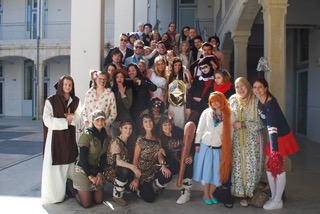Lecteur·rice·s de Harry Potter et Hunger Games ? Passionné·e·s de fantasy? Amateur·rice·s d’univers de fiction qui se déploient sur les écrans de cinéma comme de smartphone, sur les pages d’un livre comme dans des jeux vidéo ou des jeux de rôles? Auteur·rice·s de poésie, de manga ou de fanfiction sur wattpad ? Ou tout simplement curieux·se·s des phénomènes littéraires contemporains, comme de plus anciens, croisés au lycée? Cette licence de Lettres pourrait vous plaire…
Quelles sont les spécificités de cette Licence?
-
- Elle répond à la mission de proximité fixée par l’université de Nîmes depuis sa création, et propose une offre de formation générale large répondant aux projets des lycéens et étudiants du bassin de formation.
- Elle offre des enseignements mutualisés, pour une plus grande ouverture: la maquette de la licence LMA est fortement intégrée à celles des licences de LLCER Anglais et Espagnol, afin de faire converger des compétences linguistiques, littéraires et culturelles.
- Elle accorde une place importante aux langues vivantes, grâce aux enseignements de langue mais aussi aux cours bilingues dispensés en anglais ou en espagnol, dans les cours mutualisés avec les licences LLCER. Complémentaire à cela ;
- Elle propose un travail sur la mondialisation de la littérature, ouvrant à des corpus à la fois nouveaux (notamment de littérature dite « de masse ») et à des supports autres que le livre (cinéma, série, bande dessinée, jeux vidéo)
Quels sont les cours que l’on peut suivre?
Qu’y apprend-on?
Suivre cette formation induit l’acquisition d’une solide culture littéraire, d’une haute maîtrise d’expression écrite et orale, de compétences méthodologiques & linguistiques, d’une culture générale diversifiée, d’une connaissance fine des domaines professionnels ciblés et des outils indispensables à l’insertion professionnelle, notamment grâce à des stages en entreprise.
Vers quels domaines professionnels amène cette licence ?
La licence de Lettres, parcours Lettres Modernes Appliquées, vise l’intégration des étudiants dans deux domaines professionnels principaux, rendus explicites par les deux parcours de préprofessionnalisation de la 3e année, « Métiers de l’enseignement et de la recherche » et « Métiers de la culture et des médias ». Les cours de préprofessionnalisation sont orientés vers la compréhension des enjeux propres aux métiers de l’enseignement, aux métiers des industries culturelles et créatives, aux métiers du livre, de l’édition et de la conservation, aux métiers du journalisme. Les compétences liées à ces différents domaines sont acquises grâce à une historicisation des usages et une réflexion sur les pratiques. Les stages sont un temps d’observation et d’analyse pour les étudiants, qui doivent rédiger un retour critique dans un mémoire.
Quelles poursuites d’études?
- Master MEEF (vers les concours de l’enseignement, CRPE, CAPES, Agrégation)
- Master Recherche
- Master Métiers du livre, Études Culturelles, Médiations culturelles, Communication…
- Master Humanités et Industries Créatives (« Master Fiction », de l’université de Nîmes, voir http://masterfiction.unimes.fr
- Écoles de journalisme


